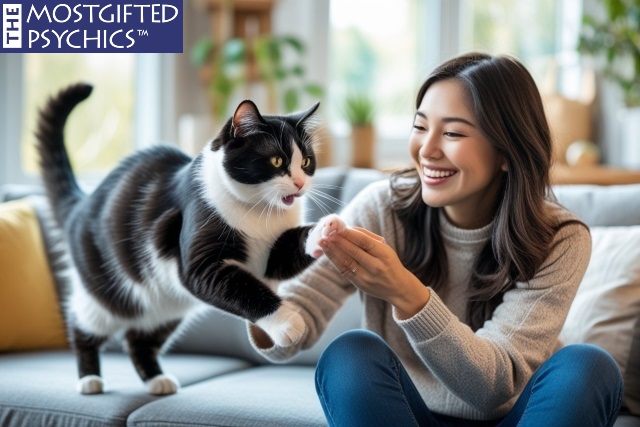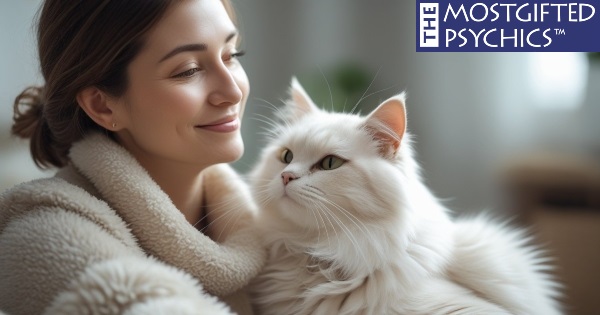Can Cats Sense Your Emotions & How They Respond?
You walk through the door after a terrible day, and before you can even set down your keys, your cat appears…not demanding food like usual, but quietly settling beside you with gentle purrs. It’s almost as if they knew exactly what kind of day you’d had, and you begin to wonder:
Can cats sense your emotions?
Yes, cats can sense human emotions through facial expressions, body language, auditory cues, and even emotional odors. Research in animal cognition shows that domestic cats have developed sophisticated abilities to recognize and perceive human emotions as part of their social behavior, responding in their own way.
In our last article, we discussed the hidden ways cats communicate with us. Today, we’ll explore exactly which human emotions your cat can detect and how they react to each one.
What human emotions can cats sense?
The range of emotional states cats detect surprises a lot of people who seek guidance from pet psychics. From subtle cues in your voice to changes in your scent, your feline friend uses multiple senses to read your moods and adjust their behavior accordingly.
Sadness and Depression
Cats sense sadness through a combination of visual and auditory cues. They pick up on your slower movements, quieter voice, and even the emotional odors your body releases during distress. Your facial expressions change when you’re sad, and research suggests cats are remarkably skilled at reading these human emotional expressions.
When you’re feeling down, your cat likely notices before anyone else does…it’s their intuition.
Cats respond to sadness by increasing their physical presence around you. For example, sitting closer than usual, following you from room to room, or positioning themselves where they can maintain eye contact. Some cats will gently head-butt their sad owners or bring toys as gifts.
The findings demonstrate that this response isn’t random. Cats have learned through thousands of years alongside human companions that certain emotional signals require different responses.
When they detect sadness through your body language and auditory signals, they instinctively shift into a more nurturing mode, strengthening your bond.
Happiness and Joy
Cats also pick up on positive emotions with impressive accuracy. When you’re happy, your voice becomes more animated, your movements are livelier, and you emit odors that signal contentment. Cats read these visual and auditory signals and mirror your energy in their own feline way.
A joyful human creates an entirely different atmosphere that cats find inviting. You’ve noticed how your cat becomes more playful when you’re in a great mood, right?
Suddenly, they’re interested in that toy they’ve ignored for weeks, or they start their adorable “zoomies” around the house. Some cats will even vocalize more, chirping or trilling as if joining your celebration.

Based on our research on the topic, domestic cats have developed this emotion recognition because positive human moods historically meant safety, abundance, and good times ahead.
So, don’t think your cat’s increased playfulness during your happy moments is a coincidence…it’s their way of participating in your joy and reinforcing the positive emotional connection you share.
Interestingly, two cats in the same household will sometimes both respond to their owner’s happiness by becoming more social with each other. Thus, positive human emotional states can influence the entire household dynamic.
Anxiety and Stress
Cats are particularly sensitive to stress and anxiety. They detect elevated stress levels through multiple sensory channels. When you’re anxious, your breathing changes, you move differently, and your body produces distinct odors that your cat’s keen nose picks up immediately.
As discussed in an article published by Nature.com, cats even employ asymmetric nostril use to better analyze these chemical signals.
We must note that cats react to human stress in different ways. While some become extra clingy and try to comfort their anxious owners, others prefer to give you space, retreating to their favorite hiding spots until the emotional storm passes.
If you think about it…this behavior actually serves both you and your pet.
Cats instinctively understand that stress can be contagious in the household. By either offering comfort or creating distance, they’re managing their own well-being while responding to your emotional state. Clever animals, aren’t they?
Previously thought to be aloof and independent, cats actually play a central role in regulating household energy. When they sense your anxiety, their response (whether it’s purring nearby or simply staying calm themselves) can actually help lower your stress levels.
Interestingly, cats often extend their comforting presence beyond waking hours. Anxious pet owners share their cats appearing in dreams during particularly stressful periods, offering reassurance and calm energy when it’s needed most.
Fear and Nervousness
Fear creates some of the most noticeable changes in human behavior, and cats are quick to detect when their owners feel nervous or frightened.
Your elevated heart rate, tense posture, and anxious breathing all signal danger to your feline companion, who relies on social skills developed through generations of animal evolution.
Similar to when cats sense spirits in the house, when they sense fear in their human companions, they become hyper-alert themselves.
You might notice your cat’s ears swiveling toward potential threats, their pupils dilating, or their body lowering into a cautious crouch. Some cats would position themselves between you and whatever they perceive as the source of your nervousness.
Something that clearly shows the deep bond between cats and humans.
Your cat doesn’t just recognize your fear but takes it seriously and prepares to respond accordingly. If you’re nervous about someone entering your home, don’t be surprised if your typically social cat suddenly becomes wary and watchful…just don’t think your cat is a skinwalker.
What we find fascinating is that cats can distinguish between rational fear (like being startled by a loud noise) and chronic nervousness.
Our gifted psychics have communicated with cats living with anxious owners. They’ve developed their own coping strategies, sometimes becoming more independent or seeking out calm spaces where they can decompress from the household’s emotional intensity.
Anger and Frustration
When you’re angry or frustrated, cats quickly pick up on the dramatic shift in your emotional signals. Your voice becomes sharper, your movements more abrupt, and your entire body language broadcasts tension. Cats are experts at reading these warning signs and will adjust their behavior accordingly.
Most cats will react to human anger by making themselves scarce. They’ll slink out of the room, find a high perch to observe from a safe distance, or disappear until the emotional temperature cools down. Not because they’re afraid of you personally…
But because cats have learned that angry humans are unpredictable.
Some cats display what researchers call social referencing. They’ll watch your facial expressions and body language to determine how they should respond to a situation. If you’re shouting at a malfunctioning printer, your cat might avoid that entire area of the house, associating your anger with it.
Unfamiliar people who display anger or frustration in your home will trigger an even stronger response from cats. They’ll hide completely or position themselves near you, offering spiritual protection.
We often tell our clients to rely on their cat’s reactions as a reminder to manage emotions for everyone’s well-being.
Strengthening the Emotional Connection With Your Cat
We hope you found this article helpful. Both science and our practice confirm that cats can sense and recognize human emotions.
However, understanding the deeper meaning behind your specific cat’s emotional responses requires more than behavioral observation and basic animal communication techniques.
In our years of experience, we’ve realized that every cat processes and responds to their owner’s emotions differently based on their personality and spiritual connection.
Perhaps you’ve noticed your cat has particularly strong reactions to certain moods. For example, they disappear when you’re mildly stressed but become protective when you’re truly fearful.
Or maybe your cat responds to your sadness in ways that seem almost too intuitive…as if they’re trying to communicate something specific back to you beyond simple comfort.
These individualized responses show there’s a deeper conversation happening between you and your feline companion. Your cat isn’t just reacting to your feelings…they want to share insights, and even offer guidance.
Over the years, our gifted pet psychics have mastered translating these subtle, personalized messages that make your relationship unique.
They can help you understand why your cat chooses specific responses to your emotions and what they’re attempting to tell you.
Learning how to communicate back will strengthen your bond.
If that’s something you’d like to explore…reach out today.
See Who’s Online Now





